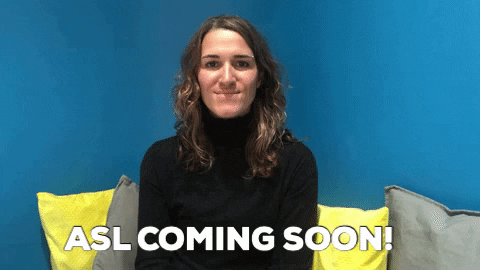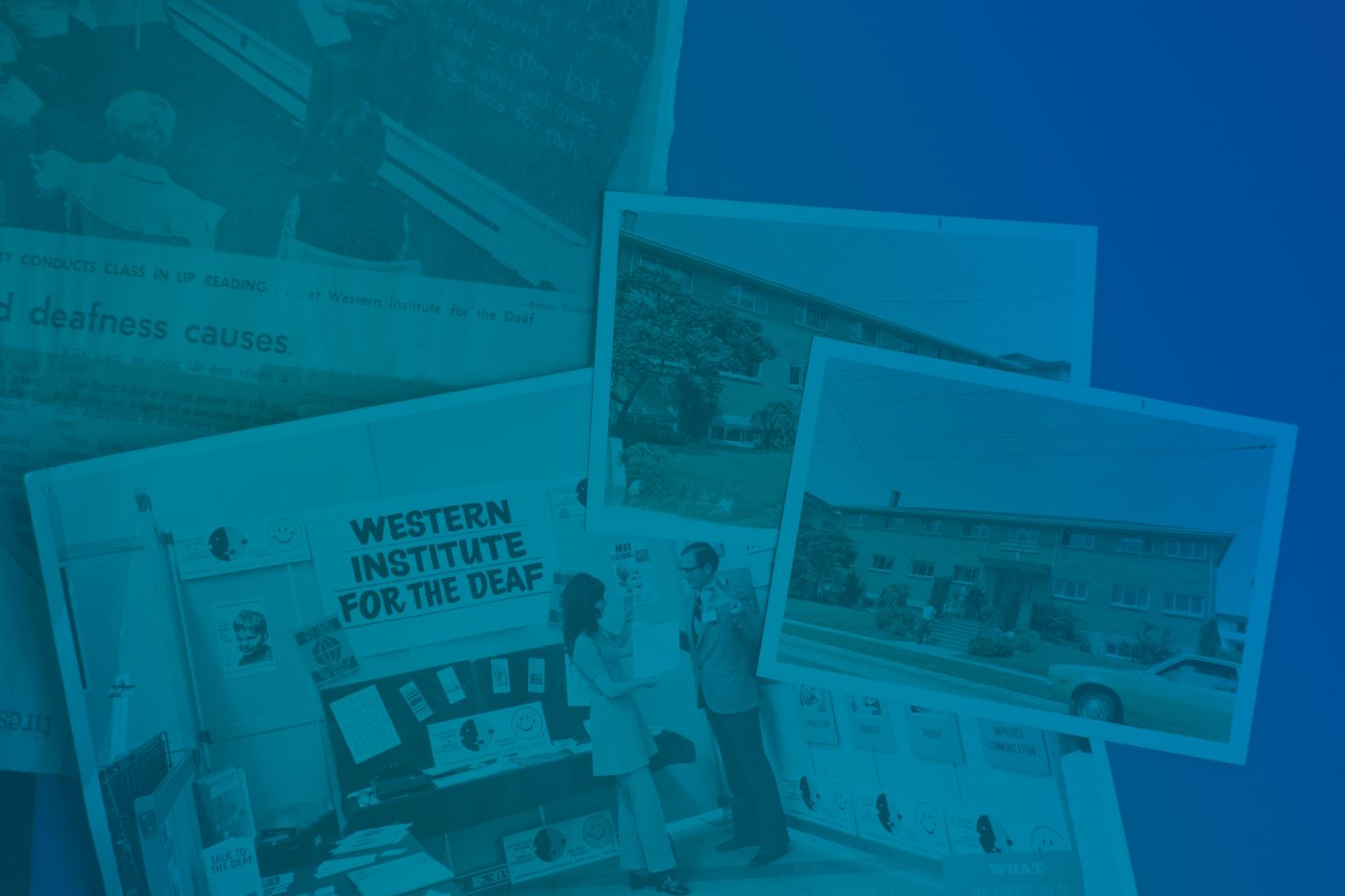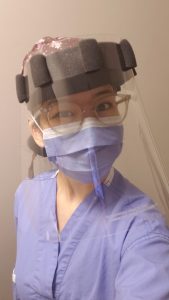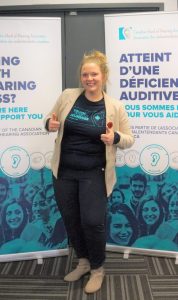Featured Profiles:
National Nursing Week 2020: May 11-17
A Voice to Lead — Nursing the World to Health
Wavefront Centre features three stories of hard of hearing Registered Nurses across the nation

*** Please note all our offices will be close for the Civic Holiday – Monday, August 5, 2024***

Wavefront Centre features three stories of hard of hearing Registered Nurses across the nation

“As frontline workers, we don’t know what we’re walking into every shift, ever. Every nurse will have their own process but I like to start my day off getting into “the zone.” Then I leave the house packed.
Everything is double-bagged with an additional plastic bag, just in case. I bring extra hearing aid batteries, but no extra compilot cables, audio cables, or hearing aid cleaning tools –I run the risk contamination if I don’t absolutely need them. Trust me, every possible “what if” scenario has crossed my mind before, many times.”
Read more about NicoleCan you share what a regular day is like now?
A “regular” day. Well, it still involves getting up at 5:00 in the morning! But with more time designated to preparing for a possible day in the covid unit.
As frontline workers, we don’t know what we’re walking into every shift, ever. Every nurse will have their own process but I like to start my day off getting into “the zone.” Then I leave the house packed.
Everything is double-bagged with an additional plastic bag, just in case. I bring extra hearing aid batteries, but no extra compilot cables, audio cables, or hearing aid cleaning tools –I run the risk contamination if I don’t absolutely need them. Trust me, every possible “what if” scenario has crossed my mind before, many times. But I need to weigh out the risks and benefits.
As soon as I get into my PPE, everyone immediately becomes noticeably muffled and unrecognizable.
It takes me a few adjustments to get my hearing-aids-glasses-face-shield-scrub-hat-and-mask setup just right before I have to fix it again. Usually, my hearing aid needs some tucking into my mask to stay put.
Patient care is almost the same. Except… I am more short of breath re-breathing my own carbon dioxide. Phone calls are harder. Building relationships with patients is harder. Accepting that this is temporary for everyone is hard on some days, but sometimes really difficult on other days.
Meal breaks are spent resting my brain exhausted from straining to hear. Though sometimes I brush past this and enjoy a warm-hearted chat with a colleague. Or lend an ear to a frustrated colleague.
I usually come home with my voice a little louder from speaking up all day. Wrinkles along my cheeks and forehead. And laundry running for another day of work.
What type of device to you use for hearing?
I wear two bilateral behind-the-ears hearing aids. I use a Phonak compilot to connect to devices like my electronic stethoscope. But I recently had to purchase an after-market Bluetooth connector to make my PPE more contact-less (I used to use a direct audio cord).
And I still use my Roger Pen. I also wanted to mention that my de-humidifier is an important device for optimizing my hearing aids’ functionality!
Has wearing PPE affected the way you work?
Totally. But it’s not just me. It’s our patients. It’s the families and loved ones that are affected. PPE can be so alienating and de-humanizing. Yet it’s not just about the PPE. It’s the virus too.
We are all affected by this. At the same time, the PPE and the dangers of the coronavirus have sometimes made me feel inadequate as a nurse. Sure, PPE blocks my ability to fully speech-read. But patients are negatively impacted by not being able to see our faces of support. Plus as nurses, we should be practising physical distancing from patients. So it has been challenging delivering patient-centred care in that sense.
However, PPE has also brought up some important questions professionally. Like, will I be able to hear through the PPE what is being asked during a cardiac arrest? What if I experience a sudden, worsening hearing loss? It has certainly prompted me to think ahead. And I have been afraid to ask, yet eager to find answers, for fear of being discriminated against. There may still be questions I don’t have answers to yet but the keyword is “yet.”
And I hope one day we take our experiences from this mask-and-lack-of-accurate-captioning ordeal and create a better plan for next time. The Tinkerine + Wavefront face shields have made it easier for me to see compared to my goggles, and I feel more protected due to the increased coverage. Thank you again for the face shield!
How are you coping with the pandemic as a registered nurse?
By now, things have settled in terms of panic-type of anxiety (half-jokingly). I do need to remind myself that being prepared helps but no matter what, this may be as ready as I’ll ever be. I still try to learn where I can, when I can. Like, I’ve received a little run down of how covid positive cardiac arrests are set-up, so that helps.
I keep in touch with my educators. Keep an open-mind and observant eye on what other hard of hearing health professionals are doing. Staying in touch with my nursing colleagues and close friends have been super important as well. We really are in this together. 👊
How are you coping with the pandemic outside of your occupation? What are you doing differently?
I am trying my best to stay accountable for my well-being! And trying not to kill my new house plants! Also reading and listening to instrumentals. And art-ing when my partner and I can.
Otherwise, I am still mentoring healthcare students at the UBC Interprofessional Health Mentors Program on topics about patient-centred care. Still staying involved in CiTR All Access Pass radio station about all things disability-related. And still working on a study session program focusing on leadership in partnership with the International Federation for Hard of Hearing Young People.
It’s been a struggle, still. I haven’t seen my parents since my birthday.
Do you have any comments or suggestions for the hard of hearing community?
I wanted to say to friends and strangers in the deaf and hard of hearing community that we hear you and we are with you and you are not alone. Don’t stop trying to reach out. Don’t give up. Remember this is not forever. You are important. Stay healthy!
Also!
It is important to acknowledge that PPE or Personal Protective Equipment, such as a mask and eye protection, poses significant communication barriers to not just deaf and hard of hearing people, but to people who rely on sign language, like non-verbal autistics, and people who rely on body language and tone when understanding a new language.
But masks have presented a huge limitation to deaf and hard of hearing individuals during this pandemics in two major aspects –one that it blocks speech-reading (the visual aspect), and two –the sound becomes muffled (the acoustic aspect).
Speech-reading is not the same as lip-reading. Speech-reading takes tone of voice and facial expression on top of lipreading to help fill-in the verbal gaps missed. Now imagine how hard it is for already deaf and hard of hearing individuals to communicate.

“My everyday hearing technology is my cochlear implant. I was born profoundly deaf and wore hearing aids until I was seven years old. I was then implanted, so I have had my cochlear implant for over 20 years now.
While I’m at work, I use an adaptive stethoscope in order to do my job! It works the same way as a regular stethoscope but instead of in the ear pieces I use an over the ear headsets that I can place over my cochlear implant in order to hear lung and heart sounds.”
Read more about LeannaCan you share what a regular day is like now?
I have been working as a nurse in acute care at the major hospital in St. John’s, Newfoundland. My speciality area is General Surgery/Trauma/Plastics and Burns. I have been a Registered Nurse for five years this May. As a nurse with a hearing loss, I have gravitated towards working night shifts in favor of a quieter environment, less phone calls, and less people. Because of Covid-19, there have been a lot of changes but a lot has also stayed the same. Nursing still remains busy as always in this pandemic, but there have been some new accessibility challenges that I am still continuing to work through. Everyone wears a mask, myself, my colleagues, my patients a lot of the time and even the general public. It has been a little alarming how much I relied on lip reading and I am definitely struggling to adapt to this new normal!
What type of device do you use for hearing?
My everyday hearing technology is my cochlear implant. I was born profoundly deaf and wore hearing aids until I was seven years old. I was then implanted, so I have had my cochlear implant for over 20 years now.
While I’m at work, I use an adaptive stethoscope in order to do my job! It works the same way as a regular stethoscope but instead of in the ear pieces I use an over the ear headsets that I can place over my cochlear implant in order to hear lung and heart sounds.
Has wearing PPE affected the way you work?
Wearing PPE has absolutely affected the way I work. I am at a point in my life where I have become comfortable with self-disclosing my hearing loss and fortunately I work with awesome colleagues who know me well and know my limitations. They do their best to communicate with me by using hand signals, tapping my shoulder, writing things down, repeating themselves and sometimes they have to lower their mask slightly so I can see their lips if I’m still lost. Wearing PPE has also made me realize how important good communication is. I have noticed that even people who don’t identify as having a hearing loss struggle to understand what people are saying behind a mask. Wearing PPE has made me much more self-aware of the basic principles of good communication such as looking at people, speaking slowly and clearly, and providing cues. PPE is helping me to become a better communicator to my patients as well as others.
How are you coping with the pandemic as a registered nurse?
Since Covid-19, everyone has found this new way of living challenging. For myself, with the added factor of constantly trying to listen and understand what everyone is saying with masks on can be exhausting. It is certainly worrisome to be a nurse during these times, I can speak on behalf of myself and my colleagues: we all fear bringing Covid-19 home to our families. We all take extra precautions to be safe and look out for our loved ones!
How are you coping with the pandemic outside of your occupation? What are you doing differently?
There is nothing better than taking a listening break or taking the time to relax sans cochlear implant when I am home. Talking with family and friends virtually has also been instrumental in my mental health. Staying in touch with others, getting lots of rest and self-care is essential! I have been enjoying spending time outdoors with my dogs, having some extra time to spend with my partner as well as getting a chance to do some things at home like my overdue Spring cleaning!
Do you have any comments are suggestions for the hard of hearing community?
These are extremely challenging times for everyone, let alone individuals living with a disability. Hearing loss can be an invisible disability so there are many who are struggling quietly to adapt to our new way of living. The best thing that has worked for me is talking about it. Self-disclosing you have a hearing loss goes a long way and you would be surprised that people can be very understanding and accommodating when they are aware. Also, don’t take yourself so seriously. If you didn’t understand something, or made a hearing blunder, it’s okay. A bit of good natured humor goes a long way.
Don’t be afraid to ask for what you need, if that means politely asking someone to slow down and speak more clearly, you need to do what works for you! By making people more aware of the needs of those living with hearing loss will only serve to make everyone better communicators and everyone benefits.

Ian Shaw is a hard of hearing Registered Nurse. He wears hearing aids on top of his ears, often mistaken for wearing an acoustic earpiece, akin to what a frontline law enforcement would wear.
Read more about IanIan Shaw is a hard of hearing Registered Nurse. He wears hearing aids on top of his ears, often mistaken for wearing an acoustic earpiece, akin to what a frontline law enforcement would wear. During his courageous work at the hospital, Ian is protected by wearing Personal Protective Equipment (PPE). Early in his career, Ian was exposed to viral particles in a very unfortunate situation when he was not wearing PPE’s. Safety culture, policies and education are much more established today than 20 years ago. Unfortunately, Ian was sick for many days. When Ian got better, the ringing in his ears never went away, and his hearing gradually declined.
Hard of hearing and wearing PPE’s can be difficult. Not only does it affect Ian personally, he’s found that his peers and colleagues also have to work harder in communication. While this is not necessarily a detriment, it highlights the importance of clear and accurate communication. Ian also recognizes the amount of gesturing has increased where facial expressions are now mostly hidden behind a face shield or surgical masks.
Coping mechanisms are the strategies that people often use to manage difficult emotions in the face of stress. Thankfully, Ian is strong-willed and continues to be a voice that leads. Ian, like all globally registered nurses, has faced sacrifices, work tirelessly to ensure that he provides care and attention to people that need, whenever and wherever they need it. To all Nurses around the world, thank you for your leadership, courage, profession, and sacrifice to keep us safe.
Wavefront Centre for Communication Accessibility is committed to create a barrier-free environment for our staff, clients and visitors. We acknowledge that our work takes place on the unceded homelands of the xʷməθkʷəy̓əm (Musqueam), Skwxwú7mesh (Squamish), and səl̓ilwətaɁɬ (Tsleil-Waututh) Nations.
Wavefront Centre for Communication Accessibility is the operating name for Western Institute for the Deaf and Hard of Hearing, a registered charitable organization. Charitable Registration Number #108200098RR0001
Accessible brand and website made with heart by Harc Creative